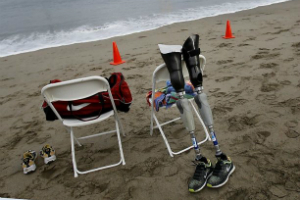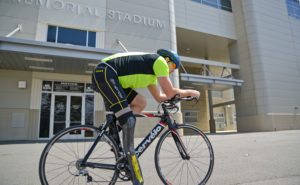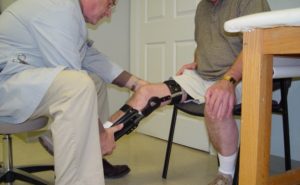Relax and enjoy your vacation by planning and preparing for travel with your prosthetic or orthotic device ahead of time.
Whether your summer travel destination is somewhere temperate and urban, or humid and exotic, you need know how to travel with your prosthetic or orthotic device. Changes in climate and routine can lead to unexpected complications and affect the success of your vacation. Swelling from exercise or sun exposure, sweat from heat and humidity, and other travel-related factors may cause discomfort if you aren’t prepared. These tips will help you get ready for your trip, and show you to deal with transportation and accommodations along the way.
Planning Ahead
Before you leave, inspect your orthotic or prosthetic device for any cracks or other potential problems. Remember that you may be engaging in physical activities that result in an increased use of your device. Don’t assume that a device with notable defects can withstand an increased level of activity. If your device has cracks or functional issues, see your prosthetist before you depart and do not try to fix the device yourself.
What to Pack
It’s important to pack yourself a travel kit to accompany your device that includes items you may need during the trip ahead. The Association of Children’s Prosthetic Orthotic Clinics has a very comprehensive list that outlines some useful items to make your vacation easier and stress-free:
- Soap – Be sure to pack a mild antibacterial soap for washing your liners, socks, and sleeves. It is critical these items are kept clean, as the moisture inside the prosthetic interface can serve as an optimum breeding ground for bacteria.
- Antiperspirant – If you’re traveling to a hot or humid climate, keep the skin around your device dry with natural liquid body powder or baby powder.
- Extra Supplies – In changing climates, you cannot always predict how your limb will react. You could see substantial changes in limb volume that could call for increasing your sock ply in order to keep an intimate fitting prosthesis. Pack an extra gel liner, suspension sleeve, shrinker, socks, or any other garment you usually use in conjunction with your device.
- Skin Dressings – The skin around your device may develop blisters or abrasions due to an increase in activity. Bring dressings to treat and protect the affected area.
Airplane Travel
If you are traveling to your vacation destination by plane, visit the TSA website to review their policies regarding prosthetic devices, as well as policies for travelers with disabilities and special medical considerations. To avoid having to verbally explain your condition to the TSA agent at the airport or risk more intense screening, prepare ahead of time by having a TSA notification card ready to present regarding your device. This can help avoid unwanted delays at security checkpoints, as well as protect from any undue embarrassment.
Although the TSA does not require you to remove your devices, the devices themselves may be subjected to additional screening. You may also voluntarily remove your device, if you are able, to allow for screening by X-ray.
Non-Air Travel
When you’re buying tickets for a train, bus, or ship, remember to tell the sales associate or customer service representative about any special needs you may have for your travel. For example, you may have crutches or a cane, or require assistance getting into and out of vehicles. Some transportation companies have specific rules regarding where to store crutches and other walking aids. In addition, many companies, when alerted, will provide assistance to passengers who need them.
Accommodations
Not all hotels, cruise lines, or resorts will have all the accommodations you may need for a comfortable stay. Ask sales associates and travel agents for information about special accommodations when you book your trip, and be sure to follow up with a customer representative upon your arrival.
For more advice about how to travel with a prosthetic or orthotic device, contact Horton Orthotics & Prosthetics or call 501-683-8889. Our background in personalized patient care gives us a special understanding of the issues facing individuals with prosthetic and orthotic devices. Our knowledgeable and helpful staff is available to answer any questions you may have.
You can also seek help through ABLE- Amputees Beyond Life’s Expectations. Topics such as these are frequent points of discussion during ABLE support group meetings, so visit ABLE’s Facebook page for upcoming meeting times and locations.
[maxbutton id=”2″]




Leave a Reply